Fatal Friends, Deadly Neighbors Read online
Page 4
In retrospect, it’s easy to ask why Susan didn’t just leave Josh. How could she stay in such a punishing relationship? She would have been welcomed by her own family in Washington State. But unless a woman has been there—and so many women have—it’s difficult to explain.
Although Susan avoided Steve Powell, even he seemed sympathetic on one of their visits to Puyallup, telling her that his whole family knew how badly Josh treated her. That was unexpected support from a surprising source, but it didn’t make Susan less wary of Steven. When she and Josh had moved from Washington State, his father’s attention and inappropriate touching were among her main reasons for wanting to get away. He sometimes touched her breasts and then acted as if it was accidental.
She was still nervous when she had to visit him and Josh’s siblings on holidays, or when Steve came to West Valley City for a visit. Her father-in-law seemed to dangle Josh like a puppet on a string. Every time now when Josh ended a phone conversation with his dad, it seemed that she and Josh had a fight.
Susan felt safe enough to confide information about Steve Powell’s “weirdness” to Kiirsi Hellewell. “A few months after they moved here,” Kiirsi remembered, “Susan told me the real reason they moved to Utah was to get away from her father-in-law. I just kind of stared at her, thinking I know people have troubles with their in-laws sometimes, [but wondering] why such a look of disgust and almost hatred [came over] her face—considering she was such a kind and loving person.
“She told me that he ‘hit on her,’ that he tried to kiss her, and that she caught him watching her get dressed one day.”
Kiirsi sensed that Steve Powell was actually obsessed with Susan. “Susan couldn’t stand him. She described him as the ‘devil.’ ”
Given a choice, Susan said she didn’t even want to be in the same state with Steve Powell.
Susan was figuratively “between a rock and a hard place.”
Divorce is a rarity in LDS mores, far more than most other religions. A family, once bonded, is supposed to last for life and all eternity. And Susan struggled mightily with the thought of divorcing Josh. Even though her bishop had seemed shocked to learn of the way she was being abused and overpowered by Josh and offered help from the church, Susan didn’t think he would go so far as to advise her to break up her marriage. Her LDS stake had helped her with money for counseling, and with groceries, yes—but divorce? She thought, Never!
But she was torn more than anyone but a few close friends realized.
“We saw how controlling Josh was and the horrible way he was treating her,” Kiirsi said. “She just kept saying, ‘I don’t want to live my life being miserable, but I want to make sure I have done everything I absolutely can to save my marriage before I walk away. But if it comes to that point and I know I do have to leave, [then] I have a clean conscience and [will know] I did everything I could to try and make it work.’ ”
Still, it was more than Susan’s religious convictions that kept her with Josh. She lived in the grip of terror. He had promised her there would be hell to pay if she attempted to leave him or take his boys away.
“Every moment I step back and take stock of what I’m dealing with it feels like a never ending cycle,” she emailed, “but I’m too afraid of the consequences, losing my kids, him kidnapping [them], divorce, or actions worse on his part if I take a stand on one of his ultimatums . . . or [like] cutting off his access to my paycheck.”
Susan told her friends that she had written a will and hidden it in her desk.
Just in case.
Later, they would look for it.
* * *
And then, almost suddenly, things simmered down in the bizarre relationship that was Susan and Josh Powell’s marriage. July 2008 had been the worst month. Had Susan left Josh then, no one knows what might have happened. But she still clung to her marriage, to the memory of the man she’d wed seven years before.
The romantic feelings that had marked their first year or so together had dried up. It was very rare for Josh to approach her for physical contact—much less sexual intercourse. Susan tried to look attractive and she had kept her figure. She was still very pretty. Josh was angry when she bought makeup or hair products, but she was able to buy a few things to enhance her looks. It didn’t matter; Josh was unceasingly cold and disinterested in her sexually.
She believed that he was emotionally ill, that somehow he could change if he had psychiatric treatment or took the right kind of medications. There were people in Josh’s family who suffered from bipolar and other mental disorders. Maybe that was what was wrong with Josh. Maybe he was clinically depressed and couldn’t help the way he acted.
She vowed to try once more, and she emailed her friends about that.
“I want him in counseling, on meds. I want my husband, friend, lover BACK. No more crazy, outrageous, outlandish beliefs/opinions.
“I know everyone else will support me in whatever decisions I make, even if that means I crash anyone’s house in the middle of the night with my boys in tow. Hope that never happens! Or stay with him. But, believe me, my bottom line is HE WILL DO COUNSELING . . . I’m sure if he fixes himself, everyone else will see a much closer version of the guy I married. And it will be easy enough to forget the hell and turmoil he’s put me through.”
At one time over that bleak summer, a friend had told Susan, “If you can’t have faith, have hope at least.”
And Susan emailed the quote back to her, adding, “I WANT to have hope . . .”
Susan Powell didn’t lack emotional support from her family, her friends, her church, and the worst of her troubles with Josh seemed to smooth over for the rest of 2008. He agreed to limited counseling for about four months, although Susan couldn’t see much progress; Josh wouldn’t admit to any fault on his part.
She worked full-time and Josh stayed home and looked after Charlie and Braden. He was good with the boys. Susan clung to that. Josh loved his kids, and maybe that would be the impetus for him to work on their marriage.
Chapter Four
In December 2008, Josh made some peculiar comments to their friends and to other men at an office Christmas party that Susan’s company hosted. But no one took him seriously. He was an odd duck and most of the people the Powells knew in West Valley City and Salt Lake City had come to expect him to be a little socially unacceptable. They liked Susan a lot, and chatting with Josh just came along with their affection for Susan.
* * *
Josh Powell was the second child to be born to Steven Craig Powell and Terrica Martin Powell. All families are different, but the Powells’ home was perhaps more bizarre than most. They were Mormons, too, but Steve was becoming more and more critical of those beliefs.
Josh’s great-grandfather Samuel Lester Powell Sr. apparently embraced one branch of Mormonism that approved of multiple marriage. Born in Alberta, Canada, in 1904, he married two women—both around 1925. One was Ella Christina Reeves, who had two children before she married Samuel, and the other was Ouita A. Laughlin. The women were very close in age; both of them were born in the late spring of 1904. Ouita gave birth to Samuel Lester Powell Jr. in 1926. It may have been that Samuel Sr. was only giving Ella and her children a home, taking her under his wing as a platonic “wife.” Brigham Young had provided rooms and “protection” in his huge home for spinsters whom no men had chosen.
The old man, the first Samuel, passed away in 1982 in Idaho Falls, Idaho, as did Ouita. Ella died in July 1989.
Samuel L. Powell Jr. was Steven’s father. All of that connected family lived in Idaho.
Steven Craig Powell, Josh’s father, was born in 1949, and his mother is listed on the family tree as Mabel J. Roach. Steven has always claimed that he was an abused child whose mother abandoned him often, leaving him with grandparents. According to him, his grandmother was cruel, telling him his mother was never coming back for him. Is this Steven’s imagination?
It may be true. Or it may not. Steven was raised around Puyallup, Washing
ton, in Pierce County, and later moved to Spokane.
Who initiated the family tree page on Ancestry.com is unknown, but it was probably Josh because his name and those of Susan, Charlie, and Braden are the last entered.
Steven Powell and Terrica Martin Powell had five children within the first several years of their marriage. Steven usually had a job, but they moved around Spokane County often. Once he began work selling prison-produced furniture, he stayed with the job for three decades.
Steven and Terrica spent quite some time near Spokane, and after they divorced in 1992, Steven eventually moved back to Puyallup. He was about eight years older than Terrica, and he was definitely the head of their household. Indeed, their marriage was almost a prototype for Josh and Susan’s union some three decades later.
Terrica “Terry” Powell was petite and plump, very soft-spoken—although, as she did at Josh and Susan’s wedding reception, she could ask for outrageous things. Her empathy—even sensitivity—was sometimes lacking. She was also a member of the Church of Latter-day Saints, but Steven had dropped away. Where he had once embraced Mormonism, he came to deny it and urged his children to do the same.
They had been married almost twenty years when Terry filed for divorce in Spokane County. She believed that Steven had emotional problems and felt he needed “serious medical help.”
Jennifer, their older daughter, who was in high school at the time, recalls how cruelly her father treated her mother. “He was extremely controlling, verbally abusive. He was always putting her down, saying things, like petty things. I mean, she couldn’t even cook a meal without getting insulted. She kept a reasonably clean house, you know, [but] with five kids, it’s hard to keep things in perfect order.”
Worse than her husband’s constant criticism, however, was Terry’s concern about the influence Steven had over their children. Some of his ideas and the books he brought home seemed focused on the dark side. One book was The Occult: A History, by Colin Wilson. Wilson, a British author, usually writes about grotesque homicide cases. The blurb on the cover of the book was written by the author: “One day I believe man will have a sixth sense—a sense of the purpose of life, quite direct and un-inferred. This is Faculty X. And the paradox is that we already possess it to a large degree, but are unconscious of possessing it. It lies at the heart of all so-called ‘occult’ experience. It is with such experience that this book is concerned.”
Occult is usually defined as relating to magic, witchcraft, or supernatural phenomena, something Terry found disturbing. Another of the books Steven Powell presented to their children was The Symbolism of Evil.
Steven had become very secretive, and Terry wondered what he kept under lock and key, forbidden to her.
Steven Powell was an angry man, particularly enraged at the LDS philosophies. He worked hard to influence his children to agree with him.
In November 1992, when Jennifer had graduated from high school and Josh was sixteen or seventeen, with John, Michael, and Alina younger, Terry filed for divorce and asked the Superior Court of Spokane to grant her an immediate restraining order to keep her estranged husband away from herself and her children. That presented a problem. Steven moved to an apartment, and he egged their children on to disobey her—even to threaten her.
Jennifer, the oldest, aligned herself with her mother, but the boys followed Steven’s lead in disrespecting Terry. Alina was too young to be a threat.
In her affidavit, Terry began with her concern about Steven’s parenting. “The Respondent [Steven Powell] is continuing to involve the children in these proceedings, including our youngest son, Michael,” Terry wrote. “Michael was at his shoulder reading Steven’s response as he typed it. Steven took him out of school early the day before to talk to his attorney. I find this totally inappropriate and unbelievable that an attorney would involve a ten-year-old boy in these proceedings when there are prior restraining provisions to the contrary. I have attached to my affidavit a copy of a letter Michael was typing . . . Obviously, Steven is involving him in the details of these proceedings.”
Terry claimed that at their father’s urging, John and Josh were coaching Michael to ignore her as she tried to care for him. Michael was enjoying all the attention as his parents and siblings fought over him, and he’d begun shouting the same ugly lies at Terry that Steven did.
“Steven and the boys—John and Joshua—are continuing to harass me,” Terry wrote in her affidavit.
“On Tuesday evening November 3, 1992, Steven was at a class. John and Joshua prevented me from putting Michael to bed. It was after 9:30 P.M. and I had already told Michael several times to get into bed. He and the big boys were in our bedroom, watching the election proceedings.”
Terry wrote that she worried, too, that Steven had taken Michael into his bed to sleep, which seemed odd.
She described one night when, as she tried in vain to put her youngest son to bed in his own room, Josh and John ordered Terry to leave the room.
“John said to Josh, ‘Kick her! Kick her!’ ” And she wrote that she was afraid her sons were going to physically attack her. She turned the television off, but John immediately turned it back on and grabbed her wrist to stop her from turning it off. And then he stood in her way, blocking her from the set.
“Finally,” Terry continued, “I walked around the bed and picked Michael up around his chest to take him to his own room and put him to bed. John came over and took him away.”
Fearful that her smallest boy might get hurt if she tugged him away, she gave up.
Terry had complained to Steven about what had happened when he got home. He seemed unconcerned, and she told Josh that she was ashamed the way he and John were treating her.
“I told them they should show [me] a little respect, and Josh said, ‘You have to earn respect, Mom. What have you done to earn my respect?’ ”
Terry didn’t know what to do. Initially she had thought it might be okay for Josh and John to live with Steven after their divorce. But now she wondered if that was a good decision. She had found a story that one of her sons had written. It was called “Revealing Darkness” and it was horrifying. One of her sons—a boy in his teens—had written page after page of sadomasochistic fantasy, including rape, cannibalism, boiling a woman in a huge pot of scalding water and then stuffing her like a turkey and baking her. It would be ill-advised to go into any more details of his gruesome imagination.
He had also drawn pornographic and devil images. There were several sketches of what looked like the Angel of Death, or perhaps a hooded monk with a scepter. There were photographs of nude Playboy models, with his disturbing comments. And there was a half man, half salamander with a T over its genitals.
How could this be? Terry wondered, appalled.
Something was wrong in the house that Steven Powell had created. If Steven didn’t let Terry have custody of her older boys, she petitioned that they be placed in a normal, safe foster home. Indeed, she wasn’t sure she could manage them; they were big and physically threatened her.
“I love my children very much,” she explained. “[But] I am asking that minor children, Michael and Alina, remain with me and I am requesting that Joshua and John be placed with a third party until further hearing in this matter. I feel that it is very detrimental for all of us to remain in the same house with the Respondent. I feel he is not well, and it is obvious he is having severe adverse affects [sic] upon our children.”
Steven and Terry’s divorce took three years of fighting back and forth. Steven had moved into his own apartment, and he took his older sons—Josh and John—with him. Michael, eleven, Alina, seven, and Jennifer, eighteen, stayed in the family home in Veradale, Washington, near Spokane.
“My dad got Josh and John riled up,” Jennifer recalled. “They were angry . . . vocal and hostile toward my mom.”
Terry and Jennifer were truly afraid of the teenagers, fearful of what they might do to them.
“We had the doors locked against them coming
in,” Jennifer said. “And they actually climbed up onto the roof—and that was a pretty tall house—like three stories. They climbed up onto the roof and were trying like—I don’t know—[to] damage the roof or something to get in. We were afraid and we called the police on them.”
In the end, Steven got custody of their minor children. Even Alina, who was still in grade school. She would never move from her father’s home and soon became his fierce defender.
Steven Powell’s sons—particularly Josh—suffered emotional and physical abuse at the hands of their father. He was a fierce disciplinarian. Three of Steven’s children were bed wetters, a problem that continued until they were eleven or twelve. When they wet their beds, Steven made them get in a bathtub that was filled with ice water. They had to stay there for at least half an hour, and usually more. Not surprisingly, their father’s “reprogramming” didn’t work; it only exacerbated the problem.
Josh was both dependent on his father’s approval and afraid of him. As a teenager, he left Steven’s house on May 6, 1992. He wrote a note to his father:
Dad,
We talked the other day about stuff [sic] of me moving out and either living with someone else or in my car. You said that I’d probably be more unhappy, but I’m going to find out.
Tonight I wanted to go to “Youth,” but you grounded me. After some thought I decided to go anyway.
I would come home but you’d just yell, and that’s the last thing I need right now, after a crappy week.
I have to say it was definately [sic] worth it. I feel alot [sic] better now.
I didn’t have time to prepare so my room is a mess. I’ll have to box up all my stuff later.
Michael or John might as well have my room like we talked about.
Things are a bit complicated now, so please try not to make it harder.
I think it’s going to work out.
Maybe we can be better friends this way.
Josh

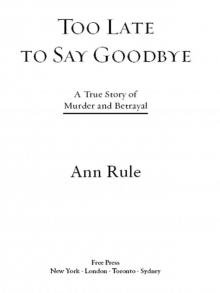 Too Late to Say Goodbye: A True Story of Murder and Betrayal
Too Late to Say Goodbye: A True Story of Murder and Betrayal Green River, Running Red
Green River, Running Red Bitter Harvest
Bitter Harvest Dead by Sunset: Perfect Husband, Perfect Killer?
Dead by Sunset: Perfect Husband, Perfect Killer?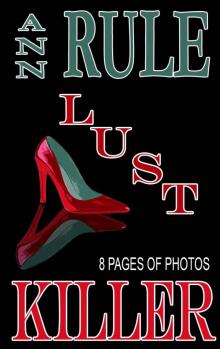 Lust Killer
Lust Killer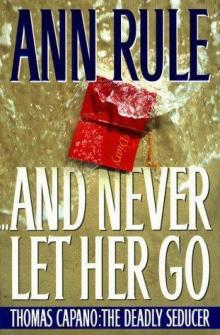 And Never Let Her Go: Thomas Capano: The Deadly Seducer
And Never Let Her Go: Thomas Capano: The Deadly Seducer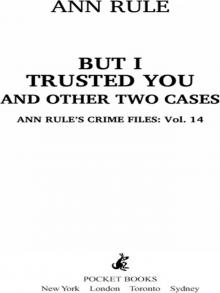 But I Trusted You and Other True Cases
But I Trusted You and Other True Cases Smoke, Mirrors, and Murder and Other True Cases
Smoke, Mirrors, and Murder and Other True Cases If You Really Loved Me
If You Really Loved Me Kiss Me, Kill Me and Other True Cases
Kiss Me, Kill Me and Other True Cases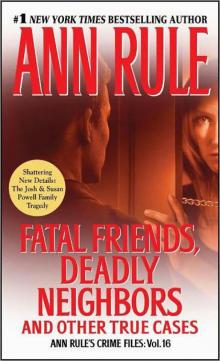 Fatal Friends, Deadly Neighbors and Other True Cases
Fatal Friends, Deadly Neighbors and Other True Cases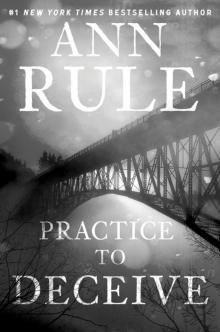 Practice to Deceive
Practice to Deceive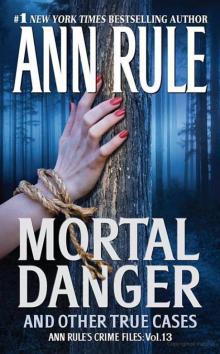 Mortal Danger and Other True Cases
Mortal Danger and Other True Cases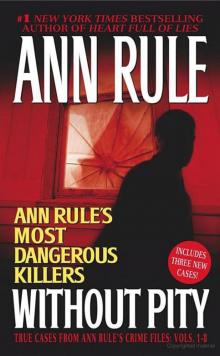 Without Pity: Ann Rule's Most Dangerous Killers
Without Pity: Ann Rule's Most Dangerous Killers Everything She Ever Wanted
Everything She Ever Wanted A Fever in the Heart and Other True Cases
A Fever in the Heart and Other True Cases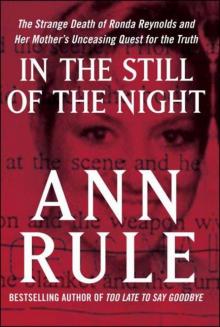 In the Still of the Night
In the Still of the Night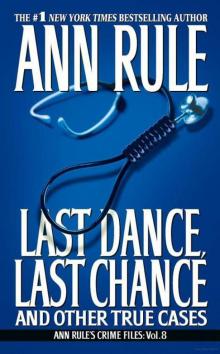 LAST DANCE, LAST CHANCE - and Other True Cases
LAST DANCE, LAST CHANCE - and Other True Cases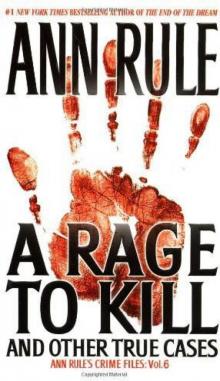 A Rage to Kill
A Rage to Kill The I-5 Killer
The I-5 Killer The Stranger Beside Me
The Stranger Beside Me Everything She Ever Wanted: A True Story of Obsessive Love, Murder, and Betrayal
Everything She Ever Wanted: A True Story of Obsessive Love, Murder, and Betrayal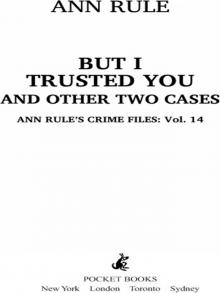 But I Trusted You
But I Trusted You Without Pity
Without Pity Kiss Me, Kill Me
Kiss Me, Kill Me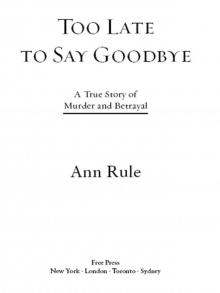 Too Late to Say Goodbye
Too Late to Say Goodbye Lying in Wait
Lying in Wait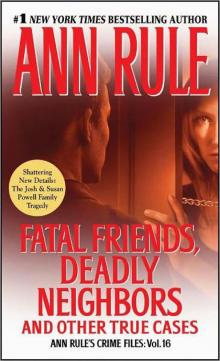 Fatal Friends, Deadly Neighbors
Fatal Friends, Deadly Neighbors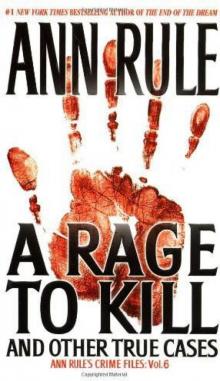 A Rage to Kill: And Other True Cases
A Rage to Kill: And Other True Cases And Never Let Her Go
And Never Let Her Go Lying in Wait Ann Rule's Crime Files Vol.17
Lying in Wait Ann Rule's Crime Files Vol.17 Blood Secrets: Chronicles of a Crime Scene Reconstructionist
Blood Secrets: Chronicles of a Crime Scene Reconstructionist No Regrets
No Regrets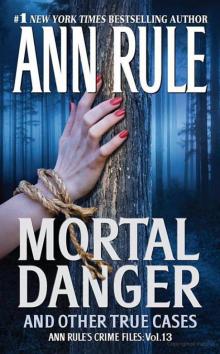 Mortal Danger
Mortal Danger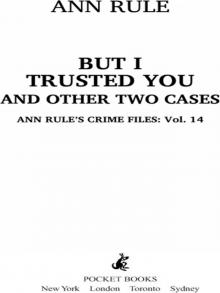 But I Trusted You: Ann Rule's Crime Files #14
But I Trusted You: Ann Rule's Crime Files #14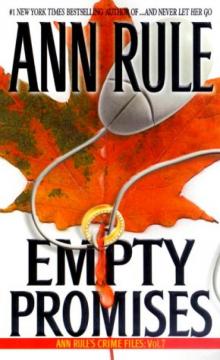 Empty Promises
Empty Promises Dead by Sunset
Dead by Sunset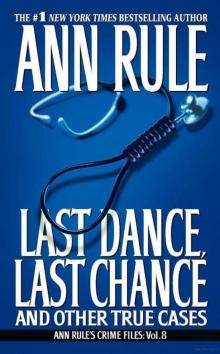 Last Dance, Last Chance
Last Dance, Last Chance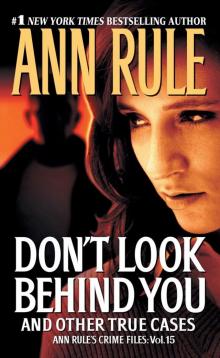 Don't Look Behind You
Don't Look Behind You